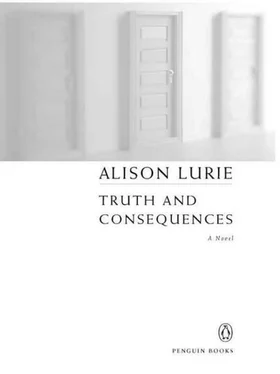“I can’t go on like this. It’s worse every day,” he muttered, leaning over the kitchen sink, gulping water and pills. He wiped his mouth on the cuff of his shirt, which should have been thrown in the laundry basket two days ago.
“I’m so sorry.” Jane put her arms around the soiled shirt and began a hug—but Alan winced, and she let go. “Sorry,” she repeated.
Not acknowledging either her sympathy or her apology, he shuffled into the sitting room and slowly, with a muffled groan, began to ease himself onto the big flowered sofa, which was now placed diagonally across the middle of the room. It had been moved around last fall so that Alan could watch television while lying down, and an end table and coffee table had been positioned awkwardly beside it. The sitting room of their hundred-and-fifty-year-old farmhouse was low-ceilinged and small, and now resembled a crowded antique furniture store. It was difficult to have more than two people over, because with Alan stretched out on the sofa there was nowhere for them to sit. They hadn’t had a dinner party for months, and they couldn’t have had one anyhow because Alan couldn’t sit in a straight chair for more than five minutes without excruciating pain. He had to eat standing up, or balance a plate on his chest as he lay on the various squashed pillows and cushions that now covered the sofa.
Only five—or was it already six?—years ago, Jane suddenly remembered, Alan had lain on this sofa in almost this same disarray of cushions, and she had lain there with him. The sofa was new then: it had just been delivered. After the man from the furniture warehouse left, Alan and Jane stood there admiring it. Then they sat on the sofa, bouncing a bit on the thick down cushions, laughing lightly. They congratulated themselves on their purchase; they kissed, and kissed again.
“We should launch it,” Alan said presently, pressing closer.
“What? Oh yes.”
“Let’s.”
It was a mild, sunny autumn day, and their clothes came off easily, falling to the carpet like the bright leaves outside. And then something strange and wonderful happened: the sofa, though of course it did not actually move, seemed to slide into a warm sea, to be borne through gently turbulent waves, which lifted and dropped them, raised and rocked them. When she was a small child, Jane had used to pretend sometimes that the big sagging green couch in the sitting room was a ship, sailing over the carpet. Now her story had come true.
“Look, we match the slipcover,” Alan had said afterward, raising himself on one elbow. Jane sat up, and saw that it was so: the creamy beige and soft brown and subdued crimson of the eighteenth-century flower pattern were echoed in their nakedness.
“Yes,” she said.
“You’re so beautiful, and so lovable,” Alan said.
“You too.”
That sea voyage, that afternoon, had been one of their best moments. And now, again, Alan lay there on the same sofa in a confusion of cushions, but he was no longer beautiful, and the expression on his face was one of pain and despair.
It wasn’t fair that he should suffer like this, Jane had told her mother only last week, it wasn’t right. But Jane’s mother, who went to the Congregational church almost every Sunday, did not agree. “We can’t understand these things, dear,” she had said, as she had said before in other circumstances. “We just have to accept them, and ask God to give us the strength to bear them.”
In a moment of despair, Jane had passed on this advice to Alan, who thought her mother a well-meaning ninny. He also did not believe in God and, as far as she knew, had never asked him for anything. “Yeah?” he had said. “And what if he doesn’t give us the strength? Even among true believers, the record for answered prayers isn’t that good.”
Now, with a cheese-grater groan, Alan turned over on the sofa. He stuck out his feet, and Jane sat on the narrow edge of the sofa beside him. Awkwardly, she untied and removed the oxfords she had put on and tied earlier that morning. It was like taking care of a giant toddler, she thought—but this child’s bare feet were not soft and smooth and lovable, but hard and knobby, with horny toenails. “Is it really bad?” she asked.
“I already said it was bad.” He spoke impatiently, angrily.
“Where does it hurt?”
“The back. Always the back. And I’ve got that shooting pain in my left leg again.”
“I’m so sorry,” Jane repeated weakly.
“It just won’t quit. Fifteen months.” Alan eased himself over onto his side, facing away from her, and in the process rucking up his shirt and revealing the back brace he now habitually wore, a kind of stiff heavy white plastic corset, all straps and Velcro, that made him look even more overweight than he was.
“Could you get me the pillows now? And maybe a couple of icepacks out of the freezer.”
“Yes, of course.”
Jane stood up. Who is this man lying on our sofa? she thought as she looked down at him. He’s still called Alan Mackenzie, but he’s not the same person. And I’m not the same person either, she thought as she climbed the stairs. I’m tired and worried and no fun for anybody, including myself. In a way we’re not really husband and wife anymore. We’re housekeeper and employer. Or maybe, in the language of a blandly instructive pamphlet she had read while waiting for Alan in some doctor’s office, caregiver and caregetter.
At first they had both thought his back trouble couldn’t be anything major, anything permanent, because it had begun in such a small way. Last year the departmental Memorial Day picnic had been held at one of the local parks, and Alan had joined his graduate students in a vigorous game of volleyball. It was a hot day, alternating sun and brief showers, and most of the other faculty members weren’t playing—he was the oldest person on the court by at least ten years. But watching him you would never have known that: he was so tan and strong and he moved so lightly and quickly.
The ball came over the net, and Alan reached for it—a long elegant reach, too long. He skidded on the bright wet grass and fell in an awkward heap, with one leg out sideways. Everyone stopped playing; people gathered around and asked if he was all right. Alan stood up at once, a little awkwardly but smiling and replying, “Fine, just winded.” But he didn’t go on with the game—instead he came to sit on the bench by Jane, saying something about getting his breath back. After a while, he suggested that they leave. He thought maybe he’d pulled a muscle, he told her, and wanted to get into a hot shower.
The shower had seemed to help, and Alan was cheerful the rest of the evening, but the next morning his back was worse. It would get better in a few days, they kept assuring each other, but it did not get better.
For a while life went on more or less as before. Alan was uncomfortable and impatient to be well, but good-natured and affectionate, just as he had been after other, earlier minor accidents or during brief illnesses. But instead of moderating, his pain grew worse. He began to move more slowly, to favor the injury. One day, Jane caught him dragging a garbage can across the floor of the garage rather than lifting it as usual; she heard the coarse scraping sound of plastic on cement that she was to hear again so often—louder after a few months, when she took over the job.
It was not the only job she took over. As time passed Alan began to do less and less around the house. He began to put on weight from lack of exercise, and to show signs of what he called “grumpiness.” But of course this was temporary, Jane told herself. In a few weeks more, a month or two at the most, he would be himself again—healthy, handsome, slim, athletic; good-natured, affectionate, and often passionate. He would love her again and make love to her again, instead of apologizing and explaining that he really wanted to, but it just hurt too goddamn much. Now, when they tried to meet, as they called it, it never really worked. Jane could never let herself go: she was always afraid of hurting Alan by a sudden movement, and sometimes she did hurt him, or he hurt himself. Then he would groan, or even cry out in pain. So she held back, and watched herself constantly, and soon their meetings had become tentative and awkwardly self-conscious, as if they were two adolescents on a date. Often Alan would break off halfway. “I’m sorry,” he would say. “I want to go on, but it hurts too goddamn much.”
Читать дальше







![Кэмерон Доки - Правда и ее последствия[Truth and Consequences]](/books/79610/kemeron-doki-pravda-i-ee-posledstviya-truth-and-con-thumb.webp)




